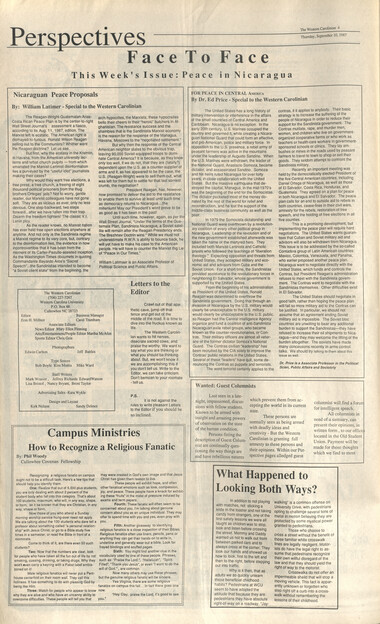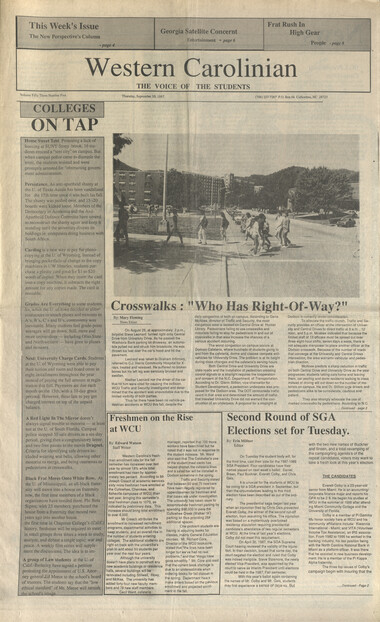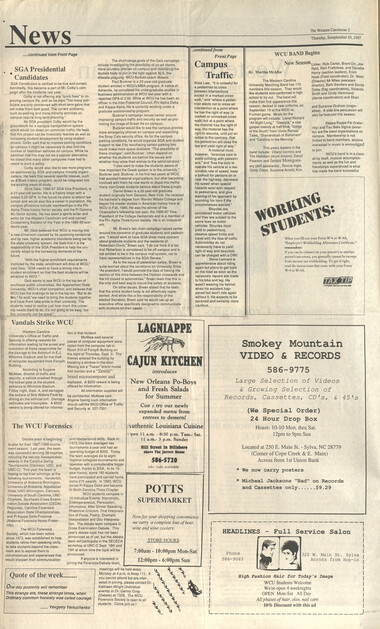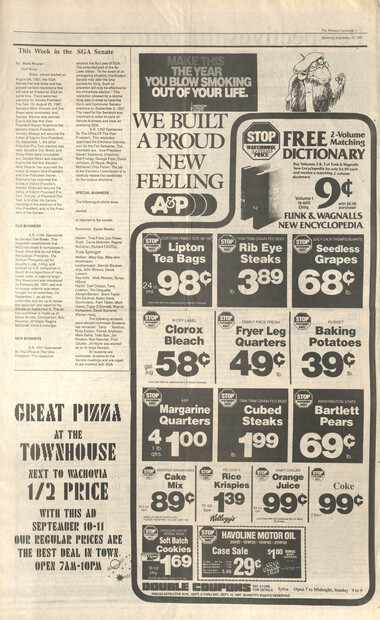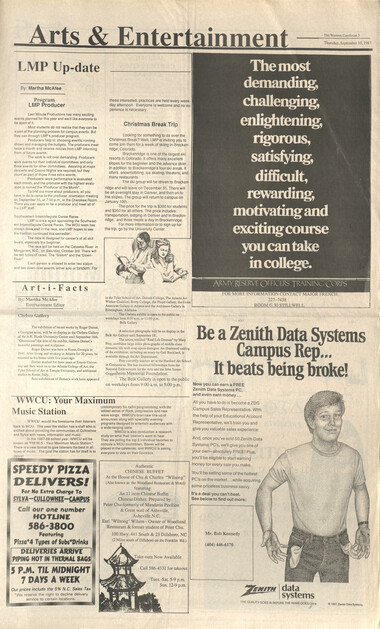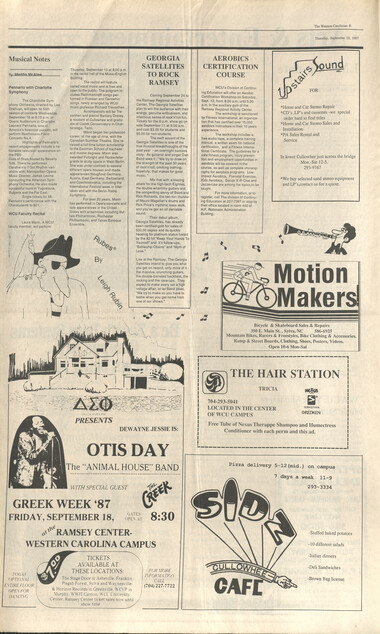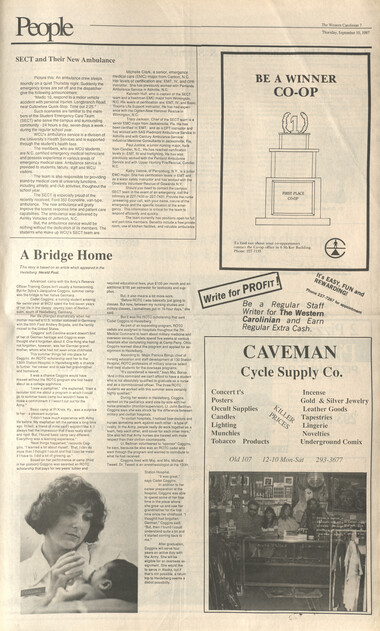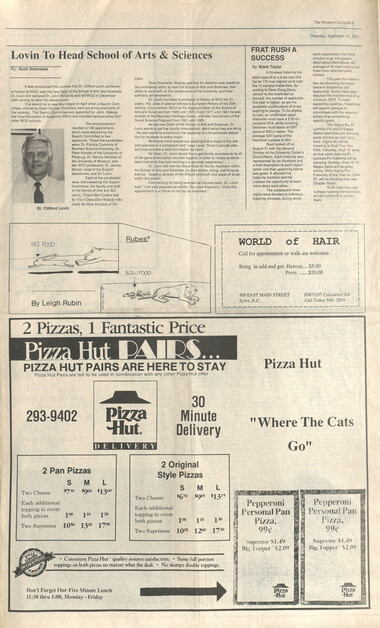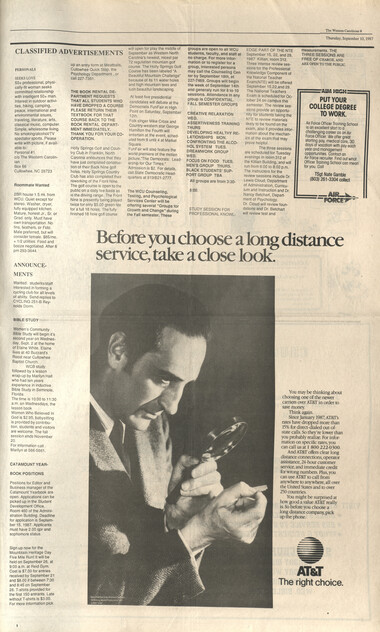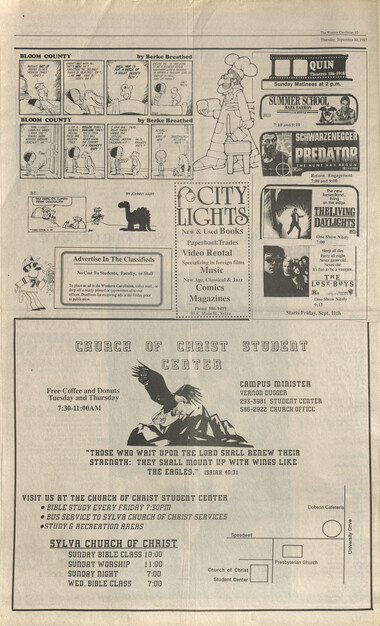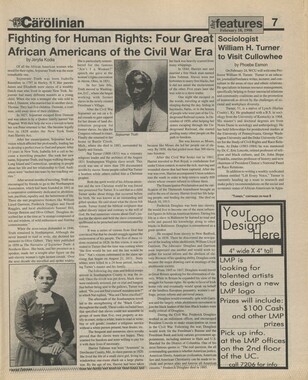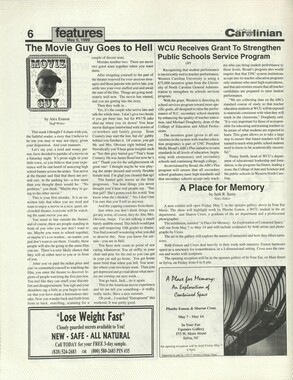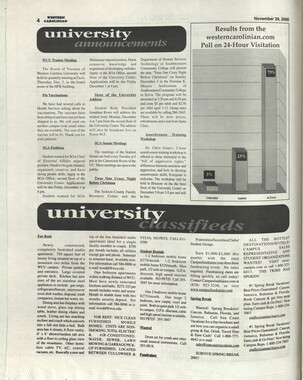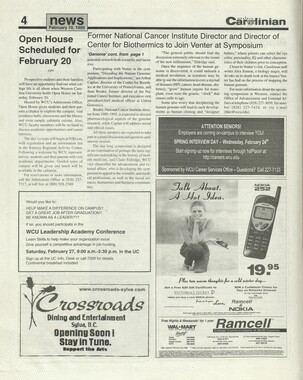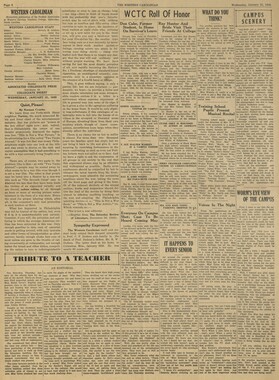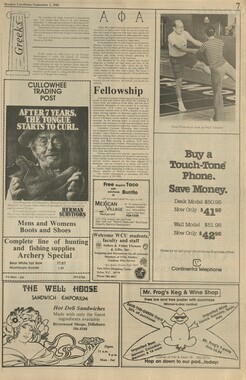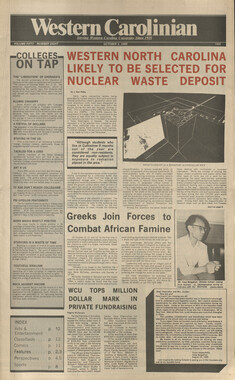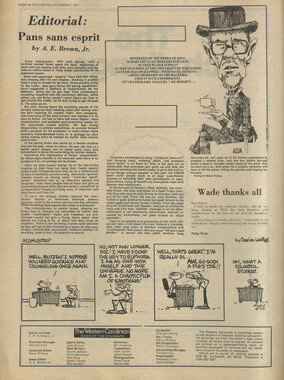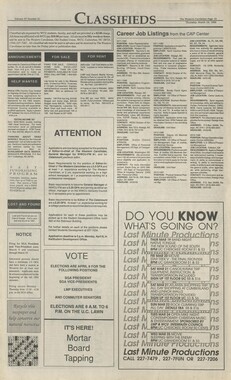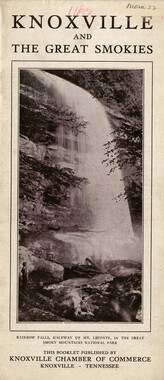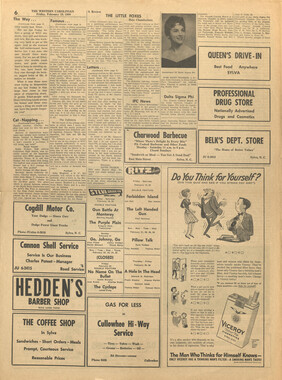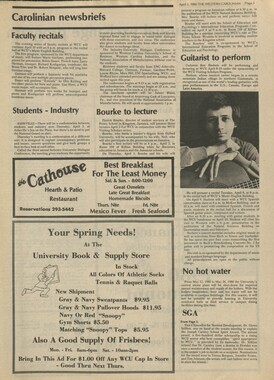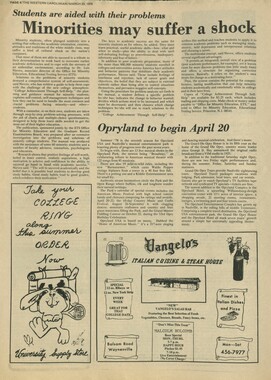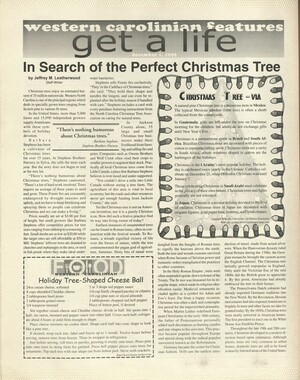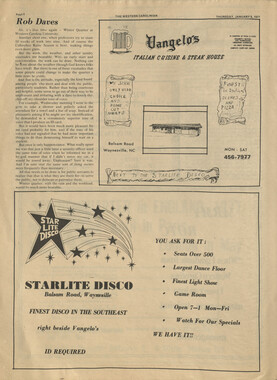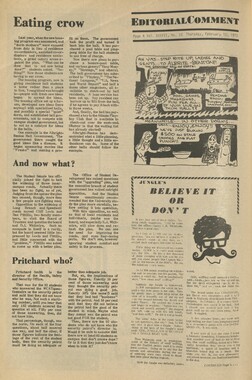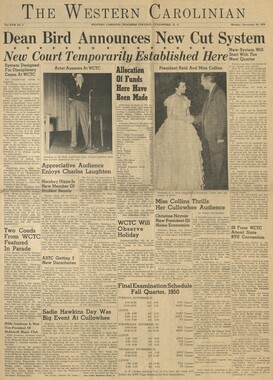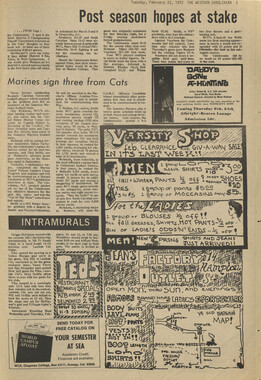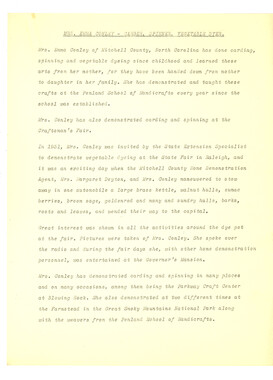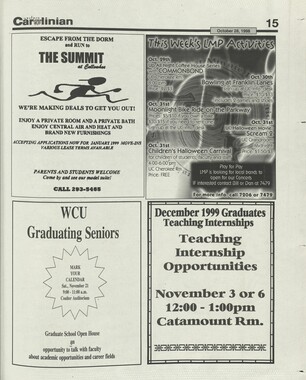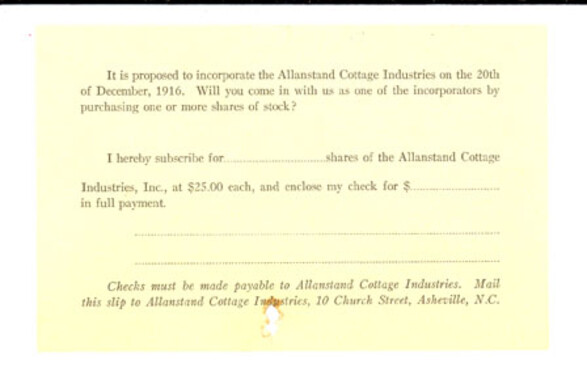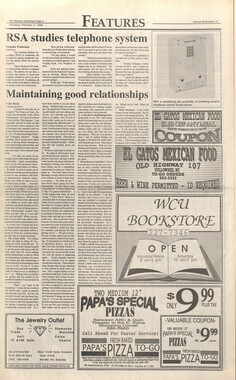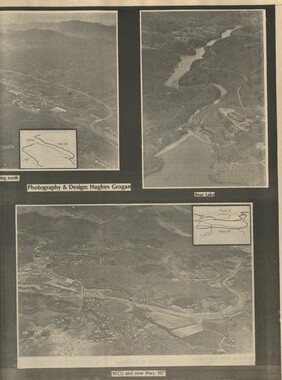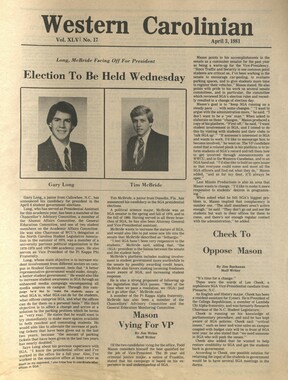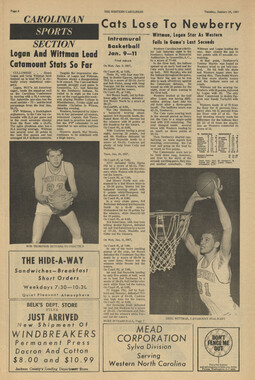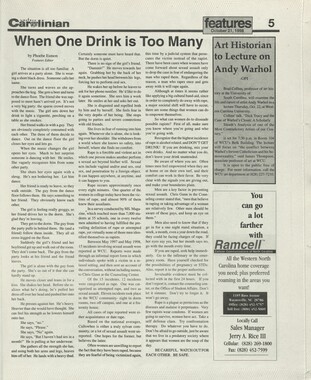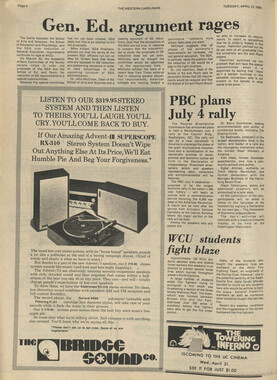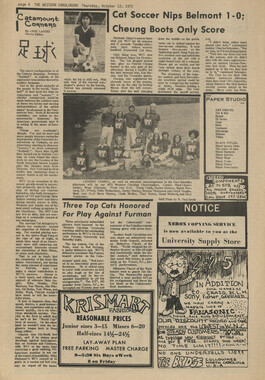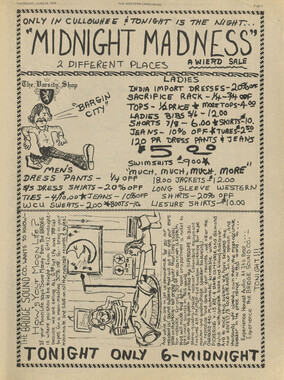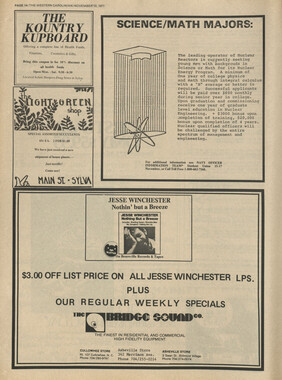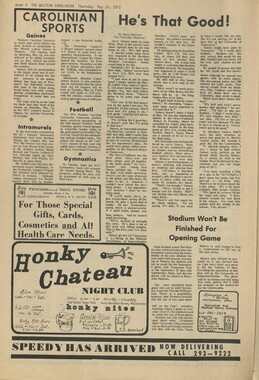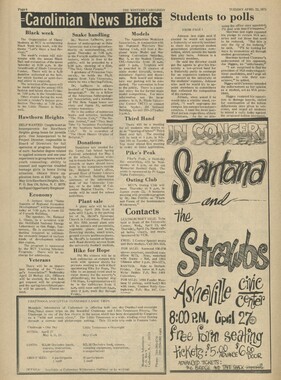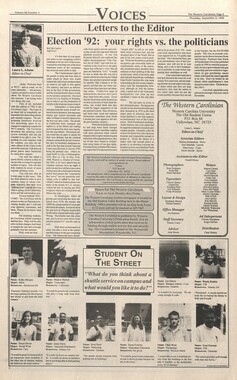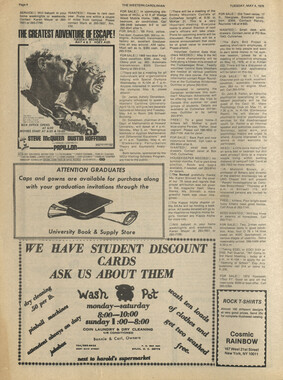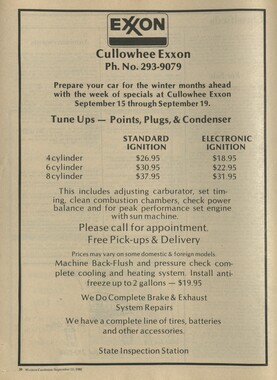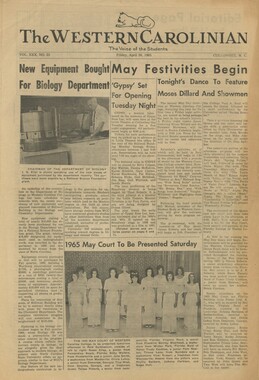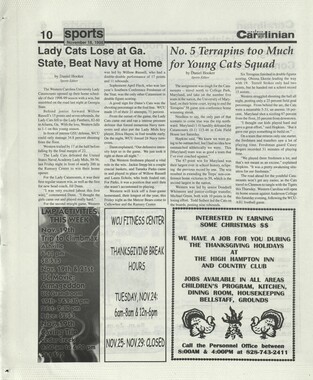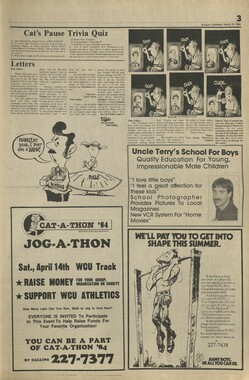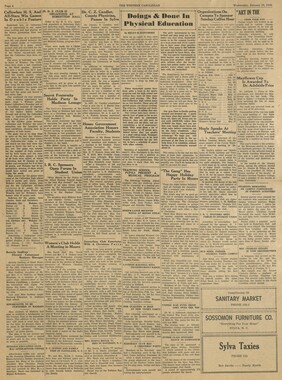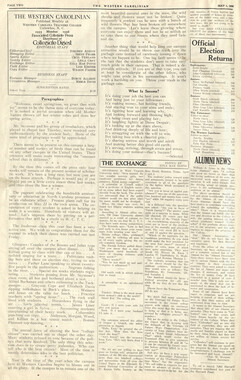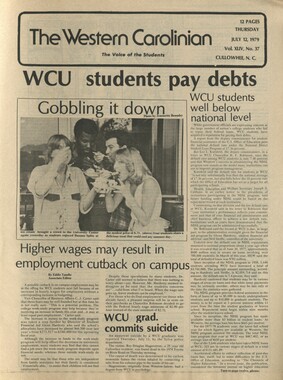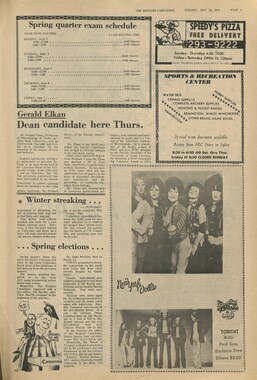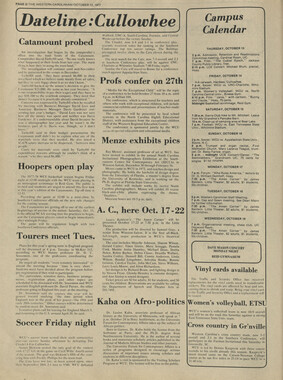Western Carolina University (20)
View all
- Canton Champion Fibre Company (2308)
- Cherokee Traditions (292)
- Civil War in Southern Appalachia (165)
- Craft Revival (1942)
- Great Smoky Mountains - A Park for America (2766)
- Highlights from Western Carolina University (430)
- Horace Kephart (941)
- Journeys Through Jackson (154)
- LGBTQIA+ Archive of Jackson County (85)
- Oral Histories of Western North Carolina (314)
- Picturing Appalachia (6772)
- Stories of Mountain Folk (413)
- Travel Western North Carolina (160)
- Western Carolina University Fine Art Museum Vitreograph Collection (129)
- Western Carolina University Herbarium (92)
- Western Carolina University: Making Memories (708)
- Western Carolina University Publications (2283)
- Western Carolina University Restricted Electronic Theses and Dissertations (146)
- Western North Carolina Regional Maps (71)
- World War II in Southern Appalachia (131)
University of North Carolina Asheville (6)
View all
- Western Carolina College (199)
- Western Carolina Teachers College (239)
- Western Carolina University (1792)
- Allanstand Cottage Industries (0)
- Appalachian National Park Association (0)
- Bennett, Kelly, 1890-1974 (0)
- Berry, Walter (0)
- Brasstown Carvers (0)
- Cain, Doreyl Ammons (0)
- Carver, George Washington, 1864?-1943 (0)
- Cathey, Joseph, 1803-1874 (0)
- Champion Fibre Company (0)
- Champion Paper and Fibre Company (0)
- Cherokee Indian Fair Association (0)
- Cherokee Language Program (0)
- Crittenden, Lorraine (0)
- Crowe, Amanda (0)
- Edmonston, Thomas Benton, 1842-1907 (0)
- Ensley, A. L. (Abraham Lincoln), 1865-1948 (0)
- Fromer, Irving Rhodes, 1913-1994 (0)
- George Butz (BFS 1907) (0)
- Goodrich, Frances Louisa (0)
- Grant, George Alexander, 1891-1964 (0)
- Heard, Marian Gladys (0)
- Kephart, Calvin, 1883-1969 (0)
- Kephart, Horace, 1862-1931 (0)
- Kephart, Laura, 1862-1954 (0)
- Laney, Gideon Thomas, 1889-1976 (0)
- Masa, George, 1881-1933 (0)
- McElhinney, William Julian, 1896-1953 (0)
- Niggli, Josephina, 1910-1983 (0)
- North Carolina Park Commission (0)
- Osborne, Kezia Stradley (0)
- Owens, Samuel Robert, 1918-1995 (0)
- Penland Weavers and Potters (0)
- Rhodes, Judy (0)
- Roberts, Vivienne (0)
- Roth, Albert, 1890-1974 (0)
- Schenck, Carl Alwin, 1868-1955 (0)
- Sherrill's Photography Studio (0)
- Smith, Edward Clark (0)
- Southern Highland Handicraft Guild (0)
- Southern Highlanders, Inc. (0)
- Stalcup, Jesse Bryson (0)
- Stearns, I. K. (0)
- Thompson, James Edward, 1880-1976 (0)
- United States. Indian Arts and Crafts Board (0)
- USFS (0)
- Vance, Zebulon Baird, 1830-1894 (0)
- Weaver, Zebulon, 1872-1948 (0)
- Western Carolina University. Mountain Heritage Center (0)
- Whitman, Walt, 1819-1892 (0)
- Wilburn, Hiram Coleman, 1880-1967 (0)
- Williams, Isadora (0)
- 1920s (57)
- 1930s (69)
- 1940s (114)
- 1950s (66)
- 1960s (314)
- 1970s (599)
- 1980s (406)
- 1990s (379)
- 2000s (195)
- 2010s (83)
- 1600s (0)
- 1700s (0)
- 1800s (0)
- 1810s (0)
- 1820s (0)
- 1830s (0)
- 1840s (0)
- 1850s (0)
- 1860s (0)
- 1870s (0)
- 1880s (0)
- 1890s (0)
- 1900s (0)
- 1910s (0)
- 2020s (0)
- Jackson County (N.C.) (2282)
- Appalachian Region, Southern (0)
- Asheville (N.C.) (0)
- Avery County (N.C.) (0)
- Blount County (Tenn.) (0)
- Buncombe County (N.C.) (0)
- Cherokee County (N.C.) (0)
- Clay County (N.C.) (0)
- Graham County (N.C.) (0)
- Great Smoky Mountains National Park (N.C. and Tenn.) (0)
- Haywood County (N.C.) (0)
- Henderson County (N.C.) (0)
- Knox County (Tenn.) (0)
- Knoxville (Tenn.) (0)
- Lake Santeetlah (N.C.) (0)
- Macon County (N.C.) (0)
- Madison County (N.C.) (0)
- McDowell County (N.C.) (0)
- Mitchell County (N.C.) (0)
- Polk County (N.C.) (0)
- Qualla Boundary (0)
- Rutherford County (N.C.) (0)
- Swain County (N.C.) (0)
- Transylvania County (N.C.) (0)
- Watauga County (N.C.) (0)
- Waynesville (N.C.) (0)
- Yancey County (N.C.) (0)
- Newsletters (510)
- Publications (documents) (1773)
- Aerial Photographs (0)
- Aerial Views (0)
- Albums (books) (0)
- Articles (0)
- Artifacts (object Genre) (0)
- Bibliographies (0)
- Biography (general Genre) (0)
- Cards (information Artifacts) (0)
- Clippings (information Artifacts) (0)
- Crafts (art Genres) (0)
- Depictions (visual Works) (0)
- Design Drawings (0)
- Drawings (visual Works) (0)
- Envelopes (0)
- Facsimiles (reproductions) (0)
- Fiction (general Genre) (0)
- Financial Records (0)
- Fliers (printed Matter) (0)
- Glass Plate Negatives (0)
- Guidebooks (0)
- Internegatives (0)
- Interviews (0)
- Land Surveys (0)
- Letters (correspondence) (0)
- Manuscripts (documents) (0)
- Maps (documents) (0)
- Memorandums (0)
- Minutes (administrative Records) (0)
- Negatives (photographs) (0)
- Newspapers (0)
- Occupation Currency (0)
- Paintings (visual Works) (0)
- Pen And Ink Drawings (0)
- Periodicals (0)
- Personal Narratives (0)
- Photographs (0)
- Plans (maps) (0)
- Poetry (0)
- Portraits (0)
- Postcards (0)
- Programs (documents) (0)
- Questionnaires (0)
- Scrapbooks (0)
- Sheet Music (0)
- Slides (photographs) (0)
- Songs (musical Compositions) (0)
- Sound Recordings (0)
- Specimens (0)
- Speeches (documents) (0)
- Text Messages (0)
- Tintypes (photographs) (0)
- Transcripts (0)
- Video Recordings (physical Artifacts) (0)
- Vitreographs (0)
- The Reporter, Western Carolina University (510)
- WCU Students Newspapers Collection (1744)
- A.L. Ensley Collection (0)
- Appalachian Industrial School Records (0)
- Appalachian National Park Association Records (0)
- Axley-Meroney Collection (0)
- Bayard Wootten Photograph Collection (0)
- Bethel Rural Community Organization Collection (0)
- Blumer Collection (0)
- C.W. Slagle Collection (0)
- Canton Area Historical Museum (0)
- Carlos C. Campbell Collection (0)
- Cataloochee History Project (0)
- Cherokee Studies Collection (0)
- Daisy Dame Photograph Album (0)
- Daniel Boone VI Collection (0)
- Doris Ulmann Photograph Collection (0)
- Elizabeth H. Lasley Collection (0)
- Elizabeth Woolworth Szold Fleharty Collection (0)
- Frank Fry Collection (0)
- George Masa Collection (0)
- Gideon Laney Collection (0)
- Hazel Scarborough Collection (0)
- Hiram C. Wilburn Papers (0)
- Historic Photographs Collection (0)
- Horace Kephart Collection (0)
- Humbard Collection (0)
- Hunter and Weaver Families Collection (0)
- I. D. Blumenthal Collection (0)
- Isadora Williams Collection (0)
- Jesse Bryson Stalcup Collection (0)
- Jim Thompson Collection (0)
- John B. Battle Collection (0)
- John C. Campbell Folk School Records (0)
- John Parris Collection (0)
- Judaculla Rock project (0)
- Kelly Bennett Collection (0)
- Love Family Papers (0)
- Major Wiley Parris Civil War Letters (0)
- Map Collection (0)
- McFee-Misemer Civil War Letters (0)
- Mountain Heritage Center Collection (0)
- Norburn - Robertson - Thomson Families Collection (0)
- Pauline Hood Collection (0)
- Pre-Guild Collection (0)
- Qualla Arts and Crafts Mutual Collection (0)
- R.A. Romanes Collection (0)
- Rosser H. Taylor Collection (0)
- Samuel Robert Owens Collection (0)
- Sara Madison Collection (0)
- Sherrill Studio Photo Collection (0)
- Smoky Mountains Hiking Club Collection (0)
- Stories of Mountain Folk - Radio Programs (0)
- Venoy and Elizabeth Reed Collection (0)
- WCU Gender and Sexuality Oral History Project (0)
- WCU Mountain Heritage Center Oral Histories (0)
- WCU Oral History Collection - Mountain People, Mountain Lives (0)
- Western North Carolina Tomorrow Black Oral History Project (0)
- William Williams Stringfield Collection (0)
- Zebulon Weaver Collection (0)
- College student newspapers and periodicals (1769)
- African Americans (0)
- Appalachian Trail (0)
- Artisans (0)
- Cherokee art (0)
- Cherokee artists -- North Carolina (0)
- Cherokee language (0)
- Cherokee pottery (0)
- Cherokee women (0)
- Church buildings (0)
- Civilian Conservation Corps (U.S.) (0)
- Dams (0)
- Dance (0)
- Education (0)
- Floods (0)
- Folk music (0)
- Forced removal, 1813-1903 (0)
- Forest conservation (0)
- Forests and forestry (0)
- Gender nonconformity (0)
- Great Smoky Mountains National Park (N.C. and Tenn.) (0)
- Hunting (0)
- Landscape photography (0)
- Logging (0)
- Maps (0)
- Mines and mineral resources (0)
- North Carolina -- Maps (0)
- Paper industry (0)
- Postcards (0)
- Pottery (0)
- Railroad trains (0)
- Rural electrification -- North Carolina, Western (0)
- School integration -- Southern States (0)
- Segregation -- North Carolina, Western (0)
- Slavery (0)
- Sports (0)
- Storytelling (0)
- Waterfalls -- Great Smoky Mountains (N.C. and Tenn.) (0)
- Weaving -- Appalachian Region, Southern (0)
- Wood-carving -- Appalachian Region, Southern (0)
- World War, 1939-1945 (0)
- Text (2283)
- MovingImage (0)
- Sound (0)
- StillImage (0)
Western Carolinian Volume 53 Number 05
Item
Item’s are ‘child’ level descriptions to ‘parent’ objects, (e.g. one page of a whole book).
-
-
Perspectives The Western Carolinian 4 Thursday, September 10,1987 Face To Face This Week's Issue: Peace in Nicaragua Nicaraguan Peace Proposals By: William Latimer - Special to the Western Carolinian The Reagan-Wright-Guatemalan-Arias- Costa Rican Peace Plan is by the center-to-right Wall Street Journal's assessment a fiasco, according to its Aug. 11, 1987, edition. The Marxist left is ecstatic. The American right is dismayed-to-furious. Ronald Wilson Reagan selling out to the Communists? Whither went the Reagan doctrine? Let us see. But first, why the ecstasy in the Kremlin, in Havana, from the American university lecterns and leftist church pulpits — from which emanated the Marxist-Leninist disinformation lies a purveyed by the "useful idiot" journalists making their cases? Why would they want free elections, a free press, a free church, a freeing of eight thousand political prisoners from the thug brothers Ortegas' jails? Not to worry, gentle reader, our Marxist colleagues have not gone soft. They are as vicious as ever, only no less devious. One step backward, two steps forward...after we have fallen into their trap. Disarm the freedom fighters! The classic V.I. Lenin ploy. As the reader knows, no Marxist nation has ever held free open elections anywhere at anytime. And not only is the Sandinista regime a Marxist regime to its very core, but, contrary to the disinformation lies, the evidence in now incontrovertible that it has been from the moment of its Carter-Pezullo-assisted inception. As the Washington Times documets in quoting Commandante Bayardo Arce's "Secret Speech"...the Sandinistas intended to become "a Soviet client state" from the beginning, the arch hypocrites, the Marxists; these hypocreites bello their cheers to their "heroic" butchers in Afghanistan. The resistance success and the shambles that is the Sandinista Marxist economy is the reason for the response of the Managua, Havana, Moscows to the "negotiated settlement." But why then the response of the Central American neighbor states to the obvious trap, leaving 90,000 Soviet-equipped troops to dominate Central America? It is because, as they know only too well, if we do not, that they are (fatally?) dependent upon the U.S. as a counter-supplier of arms and if, as has appeared to be the case, the U.S. (Reagan-Wright) were to sell them out, what was left for them but to settle for that last sorriest crumb, the negotiation? President Reagan, has, however, now promised to deliver the aid to the resistance to enable them to survive at least until such time as democracy returns to Nicaragua....the millenium! May our President's word prove to be as good as it has been in the past! Until such time, however, again, as per the Wall Street Journal, "Under the terms of the Guatemala Plan, Sandinista Nicaragua, a Soviet satellite will remain after the Reagan Presidency ends. The Brezhnev Doctrin wins." While we must not underestimate R.W.R.'s ability to bounce back, he will yet have to make his case to the American people. He will have to counter the Marxist Big Lie of "Peace in Our Times." William Latimaer is an Associate Profesor of Political Science and Public Affairs. The Western Carolinian (704) 227-7267 Western Carolina University P.O. Box 66 Cullowhee NC 28723 Editor Business Manager Erin H. Millncr Carol Trantham Associate Editors News Editor Mary Ellen Fleming Arts/Entertainment/People Editor Martha McAfee Sports Editor Chris Geis Photographers Edwin Carlton Jeff Battles Type Setters Bob Boyle Kim Morris Mike Ward Staff Writers Mark Weaver, Jeffrey Richards EdwardWatson Lisa Bristol, Nancy Bryant, Brent Taylor Advertising Sales -Kara Wykle Design and Layout Kirk Nelson Sandy Dclmct Letters to the Editor Crawl out of that apathetic cave, jump off that fence and get out of the middle of the road. It is time to dive into the f ruckus known as life. The Western Carolinian wants to hit nerves, disecrate sacred cows, and praise the worthy. We want to say what you are thinking or what you should be thinking about. But, we won't know if we are accomplishing this if you don't tell us. Write to the Editor, we can take criticism. Don't bemoan to your roomate -tell us. P.S. It is not against the rules to write pleasant Letters to the Editor if you should be so inclined. Campus Ministries How to Recognize a Religious Fanatic By: Phil Woody Cullowhee Covenan Fellowship Recognizing a religious fanatic on campus ought not to be a difficult task. Here's a few tips that should help you identify them. One: Realize that out of 5,000 plus students, you are only dealing with about 2 percent of the student body who fall into this category. That's about 100 students, maximum, who will, in any way, shape, or form, let it be known that they are Christian, in any way, shape or form. Now those of you who attend a Sunday morning worship service hung-over need not apply. We are talking about the 100 students who dare tell a profesor about something called "a personal relationship" with Jesus Christ; or go to a Bible study five times in a semester; or read the Bible in front of a roommate. Come to think of it, are there even 50 such students? Two: Now that the numbers are clear, look for people who have taken all the fun out of life by not smoking, cussing, drinking, or taking drugs. Why they won't even carry a keyring with a Pabst label emblazoned on it! Male religious fanatics will never put a Penthouse centerfold on their room wall. They call this holiness. It has something to do with pleasing God by being like Him. Three: Watch for people who appear to know why they are alive and who have an uncanny ability to overcome difficulties. These people will tell you that they were created in God's own image and that Jesus Christ has given them reason to live. These people will exhibit hope, and often other fanatical emotions such as love, compassion, joy, and peace. These people have a knack for exhibit ing these "fruits" in the midst of pressure induced by exams and term papers. Fourth: These fanatic will often seem to be concerned about you. I'm talking about geniune concern about you as an unique individual. They may offer to spend time with you and yes, even pray with you. Fifth: Another giveaway to identifying religious fanatics is a close inspection of their Bibles. Religious fanatics often use liners, pencils, pens or anything they can get their hands on to write in, underline and generally wear out a bible. Look for frayed bindings and scuffed pages. Sixth: You might find another clue in the vocabulary used by one of these people. Phrases, such as: "Praise the Lord.", "Hallelujah", "Spirit Filled", "Thank-you Jesus", or even "I want to do the will of God.", are common. Now many others may use these phrases, but the genuine religious fanatic will be sincere. Yes Virginia, there are some religious fanatics on campus this fall In fact there goes one now. "Hey Clay, praise the Lord, it's good to see you." FOR PEACE IN CENTRAL America By Dr. Ed Price - Special to the Western Carolinian The United States has a long history of military intervention or interference in the affairs of the small countries of Central America and Caribbean. Nicaragua is no exception. In the early 20th century, U.S. Marines occupied the country and governed it, while creating a Nicaraguan National Guard that could form an effective, and pro-American, police and military force. In opposition to the U.S. presence, a rebel army of peasant farmers was active in the mountains under the leadership of Augusto Sandino. When the U.S. Marines were withdrawn, the leader of the National Guard, Anastazio Somoza, became dictator, and assassinated Sandino. Somoza and his heirs ruled Nicaragua for over forty years, in close collaboration with the United States. But the massive earthquake that destroyed the capital, Managua, in the mid-1970's was the beginning of the end for the Somocistas. The dictator pocketed most of the money donated by the rest of the world for relief and reconstruction, and he lost the support of the middle-class business community as well as the poor. In 1979 the Somocista dictatorship and National Guard were overthrown by a revolutionary coalition of every other political group in Nicaragua. Leadership of the revolution and of the new government established afterwards was taken the name of the martyred hero. They included both Marxist-Leninists and Catholic priests who followed the teachings of "liberation theology." Expecting opposition and threats from United States, they accepted military and economic aid and advisors from Cuba and the Soviet Union. For a short time, the Sandinistas provided assistance to the revolutionary forces in neighboring El Salvador, whose government is supported by the United States. From the beginning of his administration as President of the United States, Ronald Reagan was determined to overthrow the Sandinista government. Doing that through an invasion of Nicaragua by the U.S. military would clearly be unacceptable to the U.S. military would clearly be unacceptable to the U.S. public, so Reagan had the Central Intelligence Agency organize and fund a coalition of anti-Sandinista Nicaraguan exile rebel groups, wno became known as the counter-revolutionaries, or Contras. Their military officers are almost ail veterans of the former dictator Somoza's National Guard. The Contras civilian "leadership" has been recruited by the CIA solely to improve the Contras' public relations in the United States. Several of these "leaders" have quit, some denouncing the Contras as puppets and terrorists. The word terrorist certainly applies to the contras, if it applies to anybody. Their basic strategy is to increase the suffering of the people of Nicaragua in order to reduce their support for the Sandinista government. The Contras mutilate, rape, and murder men, women, and children who live on government- organized cooperative farms or who work as teachers or health-care workers in government- sponsored schools or clinics. They lay ambushes or mines in the roads used by peasant farmers to travel to town to shop or sell their goods. They seldom attempt to confront the Sandinista military. Recently an important meeting was held by the democratically elected President of the five Central American countries, including Daniel Ortega of Nicaragua, as well as those of El Salvador, Costa Rica, Honduras, and Guatemala. They agreed on a plan for peace in both Nicaragua and El Salvador. The peace plan calls for an end to outside aid to rebels in both countries, cease-fires in their civil wars, amnesty for the rebels, restoration of free speech, and the holding of free elections in all five counties. This is a promising development, but implementing the peace plan will require hard negotiations. The United States wants guarantees that Cuban and Soviet military aid and advisors will also be withdrawn from Nicaragua. This issue is to be addressed by the so-called Contadora group of Latin American countries: Mexico, Colombia, Venezuela, and Panama, who earlier proposed another peace plan. Nicaragua want to negotiate directly with the United States, which funds and controls the Contras, but President Reagan's administration refuses to meet with the Sandinista government. The Contras want to negotiate with the Sandinistas themselves. Other difficulties exist in El Salvador. The United States should negotiate in good faith, rather than hoping the peace plan will fail so more military aid to the Contras can be justified. In particular, we should not assume that an agreement ending Soviet military aid is impossible. The Soviet bloc countries are unwilling to bear any additional burden to support the Sandinistas—they have refused to increase their oil shipments to Nicaragua—and they may welcome the lifting of the burden altogether. The Soviets have made many concessions recently in arms control talks. We should try talking to them about this issue as well Dr. Price is a Associate Professor in the Political Scien, Public Affairs and Socioloty Wanted: Guest Columnists Last seen in a late- night, impassioned, discussions with fellow students. Known to be armed with insight and amazing powers of observation on the state of the human condition. Persons fitting the description of Guest Columnist are continually questioning the way things are and have rebellious natures which prevent them from accepting the world in its current state. These persons are normally seen as being armed with deadly ideas and creativity - But the Western Carolinian is granting full amnesty to these persons and their opinions. Within our Perspective pages alledged guest columnist will find a forurr for intelligent speech. All columnists in need of a santuary, can present their opinions, in written form , to our office located in the Old Student Union. Payment will be made for those thoughts which we find to most What Happened to Looking Both Ways? In addition to not playing with matches, not sticking a knife in the toaster and not taking candy from strangers, one of the first safety lessons we were all taught as children was to stop, look and listen before crossing the street. Mommy and Daddy warned us not to walk out from between parked cars and to always cross at the corner. They took our hands and showed us how to look, first to the left and then to the right, before stepping out into traffic. Why is it then, that as adults we so quickly unlearn those beneficial childhood habits? Pedestrians at WCU seem to have adopted the attitude that because they are pedestrians they have absolute right-of-way on a roadway. "Jay walking" is a common offense on University Drive, with pedestrians opting to challenge several tons of metal in motion believing they are protected by some mystical power granted to pedestrians. Those who choose to cross a street without the benefit of those familiar white crosswalk lines are legally negligent. Motorists do have the legal right to assume that pedestrians recognize their own willful disregard of the law and that they should yield the right of way to the motorist. Crosswalks do not offer an impermeable sheild that will stop a moving vehicle. This fact is apparently unknown or forgotten who step right off a curb into a crosswalk without remembering the lessons of their childhood.
Object
Object’s are ‘parent’ level descriptions to ‘children’ items, (e.g. a book with pages).
-
The Western Carolinian is Western Carolina University's student-run newspaper. The paper was published as the Cullowhee Yodel from 1924 to 1931 before changing its name to The Western Carolinian in 1933.
-
